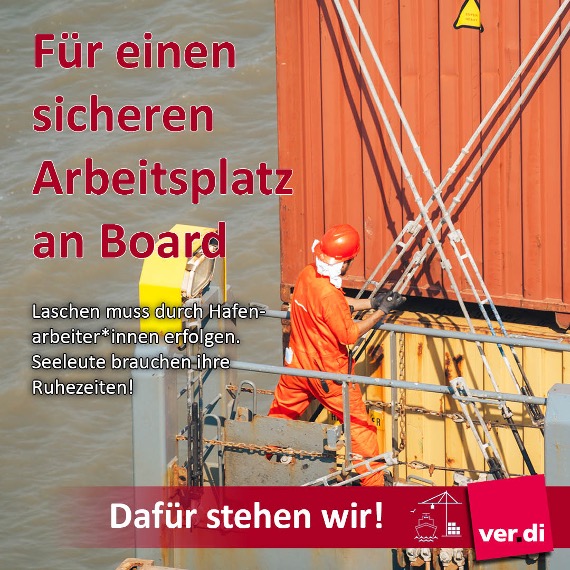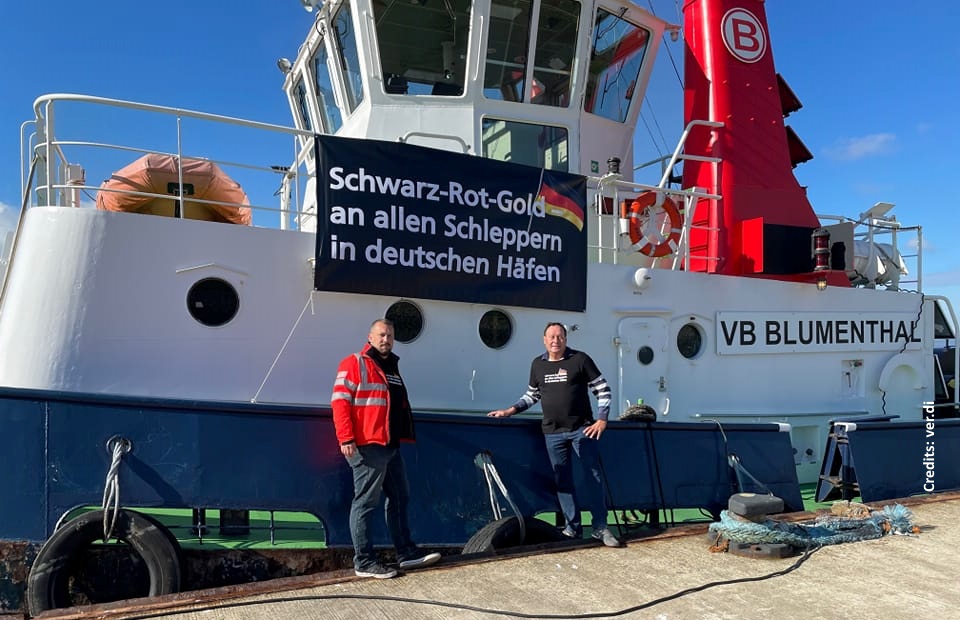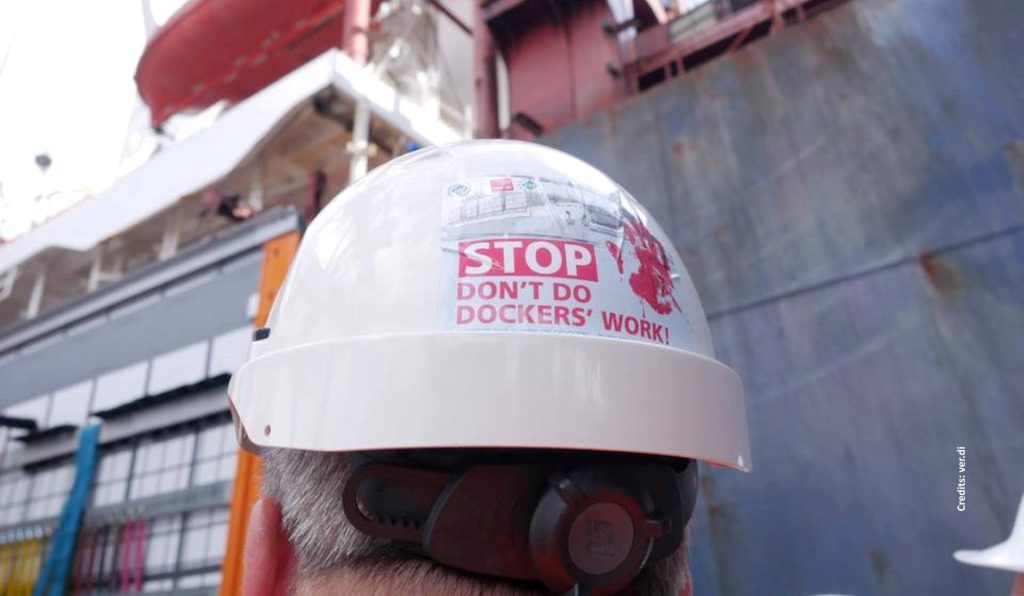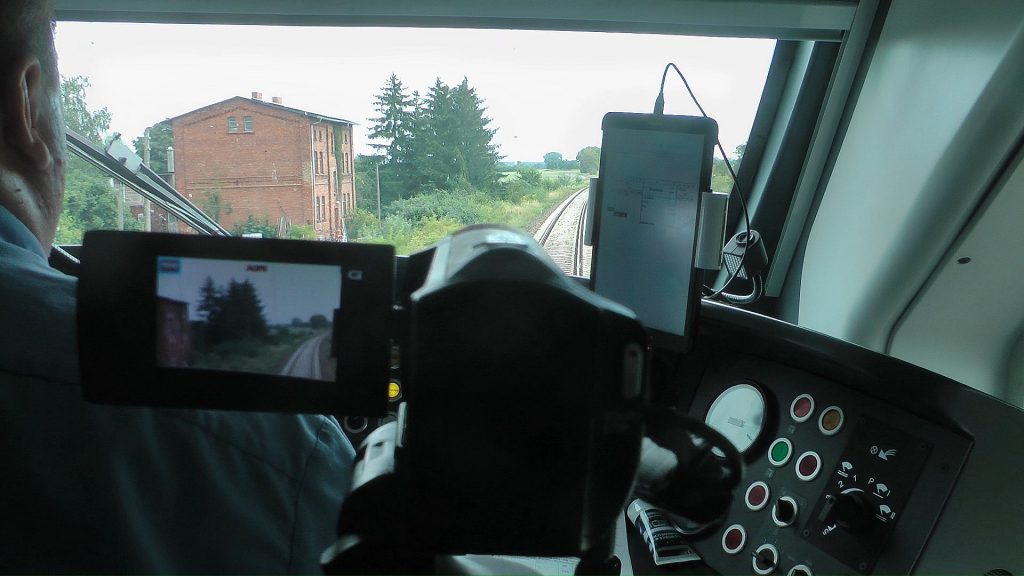The German humour singer Mike Krüger knew it exactly. “You just have to pull the nipple through the loop,” he joked in one of his hits about incomprehensible instructions for use of everyday objects. In German language, the word for “loop” is spelled similar to “lashing”. In the port business, on the other hand, “lasher” is a serious profession – and one that needs support.
The task of this professional group is, as it is technically called, “load securing of the various types of load”. Lashers are the people who climb around on the huge container ships docked in the port to attach or detach the stacks of boxes. The urgent reason for the announced meeting is, as the North German broadcasting company NDR put it, “a call for help from the lashers in the port of Hamburg”.
There are four so-called lashing companies and stevedores in the port of Hamburg: Carl Tiedemann, Hamburger Lasch GmbH (HLG) , Paul Grimm and Transpack. They employ a total of around 500 lashers. According to the platform de.howmany.eu, this professional group earns fixed basic salaries. In the Port of Hamburg, this is at least around 1,700 euros gross based on 40 hours work per week and 12 monthly salaries. With allowances, an average of between 60,000 and 80,000 euros a year comes in. This sum has to be raised by the companies that employ them.
Port of Hamburg: Union calls for better contracts
Their client is the port operator Hamburger Hafen und Logistik AG (HHLA). The problem according to ver.di: The contracts between HHLA and the lashing companies are so-called work contracts. Payment is based on a certain number of containers that have to be secured per shift. If that doesn’t work, for example because of bad weather, HHLA pays less. The corona pandemic already reduced the number of boxes handled because ships and containers are backed up. This also leads to lower payments from HHLA. For this reason, one of the companies even considered asking its workforce to forego wages. The introduction of a “job security collective agreement” was also on the agenda. Then the lashing companies could have automatically paid lower wages in case they themselves would get lower income.
The trade union ver.di has now started a petition among port workers. An open letter was sent to Hamburg’s Senator for Finance, Dr. Andreas Dressel (SPD) and the head of the HHLA supervisory board, Dr. Rüdiger Grube. The petition states, among other things: “In the past, almost all of us, the dockers of the lashing companies in the Port of Hamburg, gave up part of our wages to secure our jobs.” The demand: a top-level meeting with the decision-makers from HHLA and Senate. The bad conditions of the HHLA contracts should be improved. The lashing companies are currently in permanent economic jeopardy.
Union accuses HHLA of antisocial behaviour
“In some cases, the lashing companies even had to pay extra to carry out work for HHLA,” says the ver.di regional specialist group board member for maritime economy. HHLA and the Senator were open to a meeting without committing themselves to content. An HHLA spokesman explained that the existing agreements with the lashing companies are valid for the years 2022 to 2024. They took into account the “challenging situation that recently existed due to the disrupted supply chains”.
The trade unionists also criticise the fact that overtime is not rewarded under the current contracts between their employers and HHLA. Example: A specific price was agreed for the lashing of 192 containers per shift. If twice the amount is processed, the lashing companies and the workers do not receive twice the amount. Lashing workers’ annual performance is paid just as badly. If this service exceeds one million containers, HHLA will transfer 25 cents less for each container handled. If there are more than 1.5 million, HHLA even reduces its payments by 60 cents per container.
Third point of criticism: There is no additional payment for additional work such as connecting and disconnecting the power connection of refrigerated containers. ver.di therefore concludes: “For a group that is almost 70 percent municipally owned this is unacceptable and an anti-social behaviour. That cannot be reconciled with the values of the Hanseatic City of Hamburg and its citizens.”
ver.di position paper on maritime economy

On their Facebook page the maritime trade unionists also call for actions for better “safety on board and in the port”: “The port regulations for the ports of Bremen and Lower Saxony as well as the port of Hamburg must be adapted.” Lashing must be made mandatory as an activity that can only be carried out by qualified port workers. “In addition to stipulated training standards, the necessary work equipment for the safe and professional execution of load securing must also be made available. It must also be ensured that the seafarers are given the necessary rest periods while they are in port due to the additional work. This is the only way to ensure the protection of port workers and the quality of ship handling over the long term.”
Corresponding demands are contained in the ver.di position paper Maritime Economy. It emphasises that their demand, among other things, is already a legal obligation throughout the port of Antwerp. If only local, qualified personnel carry out these tasks, this serves the occupational safety of seafarers and maritime safety. After all, the training standards of the seafarers heading for the port are difficult to verify. “Furthermore, the necessary work equipment for safely carrying out load securing is often not made available. To make matters worse, the seafarers are deprived of the necessary rest periods during laytime in ports due to the additional work. This has already resulted in serious and fatal accidents at work.”
On the ver.di Facebook page, trade unionist Hendrik Jermies also points out that, particularly in so-called feeder traffic, ships are sometimes used “on which the safety regulations applicable to port workers are not or cannot be implemented”. Feeders are smaller cargo ships specially built for container and car transport, which act as subcontractors and distributors for large seagoing vessels and seaports. On such ships there would be “fall-prone areas, missing covers for manholes and missing tunnels for ladders and ascents”.
It should therefore be demanded “that the occupational safety laws, but at least the occupational safety regulations, of the German seaports also apply to the ship’s crews for the lay times – regardless of the ship’s country of registration.”
Budget Committee of the German Bundestag: Tugs should fly the German flag
On the other hand, the trade union views the latest maritime resolutions by the budget committee of the Bundestag as positive.

Millions of euros in funding are paid out for various tasks. The union is particularly interested in the introduction of a new flag regulation. The resolution calls on the federal government to issue a regulation by March 2023 that requires the use of the German flag for the use of tugboats on federal waterways and on the seaward approaches to the ports. This is exactly what the trade union ver.di demands.
In principle, ships providing port services should always sail under the German flag. As a result, seafarers from their own country should essentially be deployed. “Germany is in the process of gambling away its maritime know-how, and today it is needed more than ever,” explained Maya Schwiegershausen-Güth, head of the federal specialist group for maritime economy. There would be fewer and fewer German seamen. A large proportion of German seafarers are still employed in the tugboat sector and with other port service providers and suppliers. These companies also train young professionals. “We mustn’t lose that.”
Hermann Schmidtendorf, Editor-in-Chief









